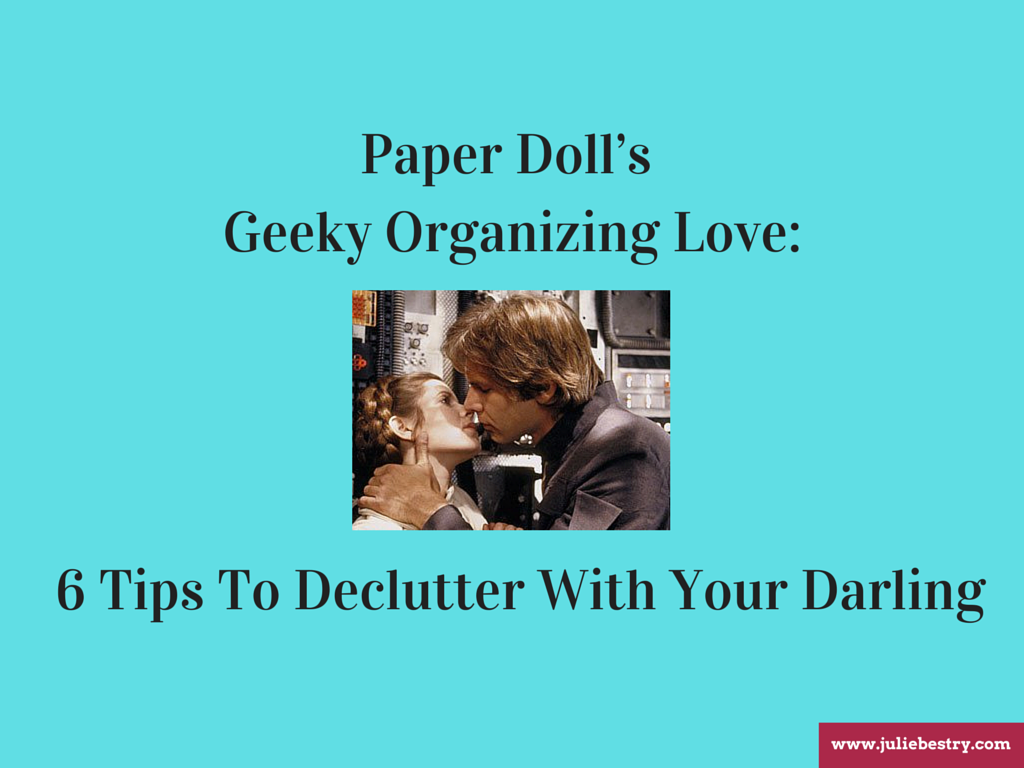Paper Doll’s Geeky Organizing Love: 6 Tips To Declutter With Your Darling
When your Valentine presents you with a gift box, whether packaged in classic Tiffany Blue or wrapped in lopsided, awkwardly taped, Sunday comics pages, your heart warms. When love fills your heart, and a gift fills your outstretched hands, it’s the thought that counts. But other times, the people you love present you with clutter, like a pet presenting you with a deceased mouse or squirrel, and just the thought of it can add a wintry layer of permafrost around the warmest of hearts.
As a professional organizer, I often work with clients whose efforts are not helped — or worse, are sabotaged — by their spouses or significant others. Here are a sampling of tips to help you help your sweetheart join in the organizing process in your home without tears or tantrums.
1) PURGE THE JUDGMENT AND TOSS THE GUILT
The first key to achieving organization as a joint effort is to remember that disorganization isn’t a character flaw. It’s not a measure of your sweetie’s maturity, intellect or worth. By and large, unless we’re discussing matters of legal concerns, financial issues, or personal safety (where a disorganized kitchen turns into a case for Tyvek-suited folks from the Centers for Disease Control), organizing is rarely a matter of right vs. wrong, but one of effective vs. ineffective.
It’s just a mismatch between the skills and systems already in place and the ever-changing demands of the world, including your demands (ahem, expectations) of your loved one.
Making people feel guilty about their clutter doesn’t help — and indeed, it can hurt their self-esteem and the loving bonds you share. Instead, create a guilt-free environment in which both getting organized and being organized can be seen as beneficial, fun and easy.
2) CATEGORIZE THE PURPOSE: START SPEAKING THE SAME LANGUAGE
With Valentine’s Day approaching, this is a romantic week, but organizing is not a particularly romantic conversational topic. Moving forward depends on making sure you start from the same place. Perhaps you’re aware of The Five Love Languages? You may know that your love language is “acts of service” and suspect your spouse’s love language is “words of affirmation.” Meanwhile, your honeybunny doesn’t have a clue about that and feels like Captain Picard relaying the Epic of Gilgamesh while trying to learn the metaphors of Tamarian before it’s too late.
You’re going to have to get on the same page and tell your loved one that for the two of you to face the beast at Tanagra (a common foe) you’re going to have to become Darmok and Jalad at Tanagra (and work together).
Start by making sure you both understand what it means to be organized, and why it’s important to get organized. For example, visual appeal just isn’t a huge motivator for many individuals. If someone is not already actively concerned with how things look, feeling pushed to declutter merely to make the house “pretty” is often a deal-breaker.
Instead of aesthetics, focus on the major tangible, temporal and experiential benefits of getting organized. Discuss how some new skills and systems will help the family save money (which can be better spent on nifty items and meaningful experiences). Show your sweetheart how the clutter of too many things in various locations (rather than in unified, categorized, even *labeled* storage) means it’s hard to find things, and how, when things are difficult to find, we tend to buy duplicates and triplicates. Reflect upon how disorganization often means missing deadlines (for filing taxes, returning rented items, paying bills, etc.), thereby causing you to have to pay fines and fees, or pay higher prices when coupons or discounts have expired.
Explore how a few organizing tweaks may also save time. If cluttered possessions make it hard to find everything from a clean shirt to the camera charger to the invitation to a wedding you’re attending, it’s slowing you down, giving you, your spouse and the family less time to focus on doing the things you actually enjoy.
If disorganization is causing you anxiety, explain that to your loved one, without blame. If you can clarify that cluttered paperwork and passwords for handling your finances makes you feel uneasy about the future, that shared clarity gives you a starting point for discussion.
Let your beloved know that you don’t see the time spent organizing as the goal, per se, but as a way to get to the goal of having more personal and family fun time.
Show your spouse the way organization (at home, at work, and for special events and activities) can reduce stress and increase overall productivity.
3) IDENTIFY THE CHALLENGES SO YOU CAN MAKE IT EASY
Next, brainstorm together how you can make the process easier. Ask your spouse what makes participating in the current system difficult in the first place.
Does your sweetie leave a phone charger, wallet, keys, pocket change and clothing in little piles all over the kitchen, living room and bedroom? Does your darling feel like there’s no place or space designated just for him or her? Perhaps the solution is as simple as figuring out what spaces would be convenient for each (a valet hook inside the closet, a bowl and charging block on a table in the entry nook, above a drawer designated just for them) and declaring them official!
Are they putting things down instead of putting things away because they don’t want to be “made wrong” by storing something where they think you’ll say it doesn’t belong? Do they cringe at the prospect of feeling clueless or being corrected?
Find ways to be equal partners, instead. Make decisions together, and then label the spaces so everyone feels empowered to put things away.
Ask your beloved if there are current storage areas that aren’t convenient – places where items are housed that don’t feel logical, or aren’t easily accessed – and rethink the placement. Perhaps the labels for the family filing system aren’t as intuitive as you think, leading to paperwork procrastination?
Everything should have a home, and if the storage place is conveniently located and labeled, it makes it easier to put things away.
Paint an outline of the tools that go on the pegboard in the garage to make it simpler to return them. Work together to label family financial, legal and medical files, or label the edges of shelves in the linen closet so everyone knows where twin sheet sets should go.
If you or your sweetie is artistic, sketch a fun little map of where foods belong in the fridge or pantry and post it on the door.
Is “when?” more of a problem than “where?” Does your spouse or significant other just not remember to do the tasks because of “clutter blindness?” If visual triggers don’t work, what about a cell phone alarm at certain times of the day, with ring tones of songs that are funny or keyed to the task at hand?
Is time an obstacle? Build time into the family schedule (perhaps a nightly 15 minutes before dinner, or mid-morning on Saturdays) for everyone (kids and grownups who act like kids, alike), to tackle their organizing tasks and brainstorm solutions to frequent annoyances.
4) MAKE IT FUN TO MAKE IT STICK
Research shows that we all have a limited amount of willpower, so instead of expecting one another to create and stick to new habits because they’re for the common good, create incentives for sticking to the new game plan.
In The Princess Bride, Westley acquiesced with a quiet “As you wish,” to Buttercup.
Once he was unmasked as the Dread Pirate Roberts and they were reunited, Buttercup (and we) learned that he wasn’t being passive-aggressive; it was his way of saying he loved her. However, if your beloved thinks of organizing as a chore, and thus procrastinates on promised clutter-busting tasks, leading to resentment on both sides, find ways to make behavioral changes an adventure, a challenge or a competition.
Appeal to the big kid inside and document successes with points or rewards. Encourage trying to beat a personal best. Consider a Seinfeldian “Don’t break the chain” effort at momentum. Just like companies have “152 days without an accident,” to avoid safety violations, you could have a kitschy whiteboard in the house keeping track of how many days your household has gone without the kids being late for school, or you having to bug one another to unload the dishwasher or put away the [laundry, gadgets, X-Box, etc.].
Once systems are in place, schedule organizing maintenance time daily and play funny music with silly lyrics to set the tone. If you have kids, you may have to listen to Let It Go for the millionth time, but if it’s just you and your sweetheart, fifteen minutes of 80s TV theme songs or some Weird Al Yankovic should do the trick.
If there are household and organizing tasks your sweetheart just can’t stand, why not make a trade? Nobody says you always have to unload the dishwasher and your partner must balance the checkbook. Exchange the least-desirable tasks and you might both gain motivation in new areas.
5) ACCEPT DIFFERING STANDARDS
Sometimes, the organizing issues between sweethearts has less to do with overcoming obstacles and identifying incentives, and more to do with what’s behind that lack of communication. To borrow from Star Trek again, some people come from a background of “Temba, his arms open,” (meaning “take or use this” — a gift) while others are more “Temba, at rest.” (where a gift has been refused or rebuffed).
In other words, some people prefer a lot of stuff around them, while others want a more streamlined or austere set-up. Your beloved’s dainty teacup collection is no less (and no more) worthy of consideration than your carefully curated 30-year-old Transformers action figures. But you have to agree on location, and keeping something on display comes with an obligation to care for it (and yes, people, that does mean dusting)!
If you came from a household where everything that wasn’t being used that minute was immediately put away, but your significant other came from one with more relaxed, cozy standards, it’s unreasonable to expect the other person to bend to your desires all the time.
For areas where compromise isn’t acceptable to the partner who wants things to be more than functionally organized but also fit a very specific aesthetic, recognize that this is not your honey’s “flaw” for you to correct. If you want to keep seven decorative pillows on the bed, while your spouse only cares about the ones on which you lay your heads, re-evaluate how important it is for the other person to join your Pinterest-Perfect perspective.
In other words, work together to find a “win” that’s valid for everyone concerned. If the reason for organizing is more tangible and meaningful than “The house looks so much nicer when it’s feng-shui-ed and organized,” then you never have to fear your darling’s resentment over couch cushions bubbling up into a loud, public reference to Doctor Who villains.
6) THINK OUTSIDE THE STORAGE BOX AND CONSIDER OUTSIDE RESOURCES
Have patience, and recognize that not everyone starts from the same place. It’s pointless to yell, “You should know how to do this!” and it’s unreasonable to expect that everyone has the same skills of pattern recognition or ability to conceptualize abstract solutions. Similarly, there are areas where there are no rights and wrongs, but merely where couples have differing organizing styles and retrieval preferences.
You wouldn’t set your own arm if it were broken, would you? You don’t expect people to be able to churn their own butter. Convey to your spouse the idea of organizing as a combination of skill and training. Can’t we all use a little help with some things? If you’re having trouble working things out together, discuss getting a trainer for *organizational* fitness!
Engaging the services of a professional organizer allows both you and your beloved to benefit from the technical expertise of a neutral, judgment-free third party. A professional organizer can provide advice and solutions that neither of you might have even considered, allowing you to move forward as loving, equal partners. (One might even say, as Valentines.)
Visit the National Association of Professional Organizers to find someone who can help you and your spouse find common ground for your organizing solutions. Neighbors to the north can check in with Professional Organizers in Canada.) The Board of Certification of Professional Organizers also has an online directory of its certificants (Paper Doll, included). And if you and/or your honey are dealing with more complex issues than situational disorganization, you may very well benefit from the guidance of the dedicated experts affiliated with the Institute for Challenging Disorganization.
Readers, unlike the TARDIS, your drawers and cabinets are not bigger on the inside. Only so much stuff can fit in so much space. But if you take this organizing advice to heart, there will always be enough space for you and the one you love.







I’m not into Doctor Who, but have been a Weird Al fan since the dawn of time, so you are officially my Valentine. <3
Thank you, Janet! This was a fun post to write!